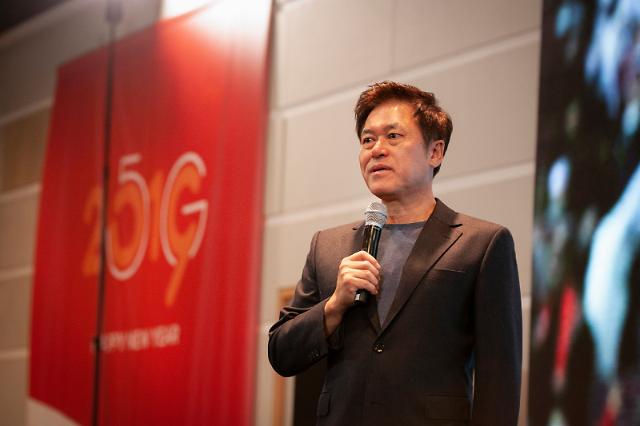
[Yonhap Photo]
SEOUL -- A new over-the-top (OTT) media company to be launched by South Korea's top mobile carrier SK Telecom (SKT) and three major broadcasters welcomes money from foreign and domestic investors as it seeks an open system targeting K-pop consumers in Southeast Asia.
SKT President Park Jung-ho vowed to launch an integrated new service by June after he signed a memorandum of understanding Thursday with MBC, SBS and KBS to merge their OTT services. "We agreed to team up with broadcasters because they need an ecosystem where K-content can grow," he told reporters.
"We will prepare to enter the Southeast Asian market in June," Park said, adding it would be an open system that allows investments by any content producers, small and large. He hopes to draw an investment of some 200 billion won ($177 million) into the new joint entity that would combine capital, marketing, platforms, and digital technology with content produced by broadcasters.
"We are waiting for Hooq and Singtel to come," he said. Asia's first premium video-on-demand service Hooq is a joint venture of Sony Pictures Entertainment, WarnerMedia and Singtel, a Singaporean telecom company.
The alliance between SKT and the three broadcasters was seen as a strategic move to countercheck Netflix, which has gained popularity since its service began in South Korea in 2016. Currently, the global OTT service has about 500,000 subscribed users in South Korea.
Aware of Netflix' growing influence in South Korea's media industry, Park indicated that the combined domestic OTT service would compete with Netflix. "Our movements are being watched closely abroad," he said, citing a case in Britain where local platforms were driven out by Netflix.
OTT services deliver film or TV drama content over the internet. Video-on-demand (VOD) services are more popular in South Korea, where some 37 million smartphone users are hooked onto super-fast networks 24 hours a day.
Netflix has strategically worked with production companies, creating original contents to meet viewers' tastes and overcome national and regional restrictions. In November last year, LGU+, a third mobile carrier in South Korea, forged a partnership with Netflix, allowing the OTT company to provide its service using LGU+'s IPTV set-top box.
Copyright ⓒ Aju Press All rights reserved.



